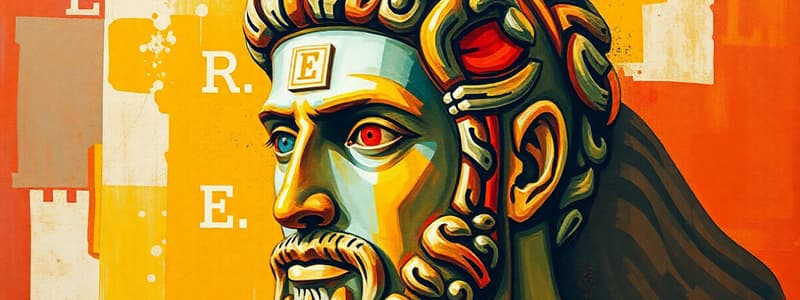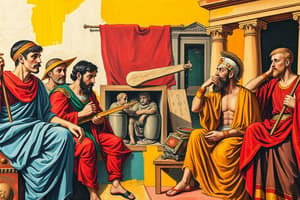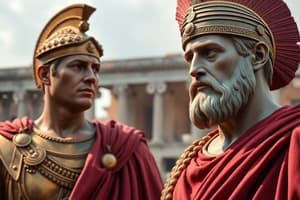Podcast
Questions and Answers
What significant period began with the reign of Octavian Augustus?
What significant period began with the reign of Octavian Augustus?
- Crisis of the Roman Empire
- Foundation of the Republic
- Era of the Gladiators
- Pax Romana (correct)
Which title refers to Octavian Augustus's role as the chief military commander?
Which title refers to Octavian Augustus's role as the chief military commander?
- Caesar
- Princeps
- Imperator (correct)
- Augustus
What was introduced during the reign of Octavian Augustus to facilitate trade?
What was introduced during the reign of Octavian Augustus to facilitate trade?
- The gold standard
- Tax reforms
- Common coinage (correct)
- Bronze currency
Which class in Ancient Rome primarily lived in luxury?
Which class in Ancient Rome primarily lived in luxury?
During which century did the decline of the Empire begin, marking the end of Pax Romana?
During which century did the decline of the Empire begin, marking the end of Pax Romana?
Which group of tribes is not mentioned as living on the Italian Peninsula?
Which group of tribes is not mentioned as living on the Italian Peninsula?
What significant natural features contributed to the protection of the early Romans?
What significant natural features contributed to the protection of the early Romans?
According to the legends, who raised Romulus and Remus after they were abandoned?
According to the legends, who raised Romulus and Remus after they were abandoned?
Which of the following statements is true regarding the origins of Rome's governance?
Which of the following statements is true regarding the origins of Rome's governance?
What was the fate of Romulus according to the legend?
What was the fate of Romulus according to the legend?
What event marked the last war fought by the Mycenaeans before their conquest by the Dorians?
What event marked the last war fought by the Mycenaeans before their conquest by the Dorians?
What sparked the Persian Wars?
What sparked the Persian Wars?
Which legendary event is associated with the Trojan War?
Which legendary event is associated with the Trojan War?
Who was the Persian king that sought to punish the Athenians during the Battles of Marathon?
Who was the Persian king that sought to punish the Athenians during the Battles of Marathon?
What was the outcome for the Persian forces after their conflict with the Athenians at Marathon?
What was the outcome for the Persian forces after their conflict with the Athenians at Marathon?
What was a significant financial issue contributing to the fall of the Roman Empire?
What was a significant financial issue contributing to the fall of the Roman Empire?
Which emperor is noted for dividing the Roman Empire for better management?
Which emperor is noted for dividing the Roman Empire for better management?
Which factor primarily led to the food shortages in the Roman Empire?
Which factor primarily led to the food shortages in the Roman Empire?
What was the role of mercenaries in the Roman army during its decline?
What was the role of mercenaries in the Roman army during its decline?
What was one consequence of the invasions by Germanic tribes and the Huns on the Roman Empire?
What was one consequence of the invasions by Germanic tribes and the Huns on the Roman Empire?
Which form of government involves rule by a small group of nobles?
Which form of government involves rule by a small group of nobles?
Who were considered free people in the Greek city-states?
Who were considered free people in the Greek city-states?
What was the main role of the Gerousia in Sparta?
What was the main role of the Gerousia in Sparta?
Which Athenian reformer is associated with the introduction of debt slavery?
Which Athenian reformer is associated with the introduction of debt slavery?
What was an outcome of Solon's reforms in Athens?
What was an outcome of Solon's reforms in Athens?
What was one of Pericles' three main goals for Athens?
What was one of Pericles' three main goals for Athens?
In what way were Spartan women different from Athenian women?
In what way were Spartan women different from Athenian women?
Which body acted as the assembly of all people in Athens?
Which body acted as the assembly of all people in Athens?
What was the role of the consuls in the Roman Republic?
What was the role of the consuls in the Roman Republic?
What significant change did the plebeians achieve through their conflict with the patricians?
What significant change did the plebeians achieve through their conflict with the patricians?
Which governing body in the Roman Republic represented the upper class and held significant power?
Which governing body in the Roman Republic represented the upper class and held significant power?
What was the primary external challenge that Rome faced during its early expansion?
What was the primary external challenge that Rome faced during its early expansion?
What was the primary purpose of the Twelve Tables in the Roman Republic?
What was the primary purpose of the Twelve Tables in the Roman Republic?
Which statement accurately reflects the power dynamics between patricians and plebeians in the early Republic?
Which statement accurately reflects the power dynamics between patricians and plebeians in the early Republic?
Which of the following represents a cause of the Punic Wars?
Which of the following represents a cause of the Punic Wars?
Who was a prominent leader of Rome during the Punic Wars?
Who was a prominent leader of Rome during the Punic Wars?
Who was the leader of the Persian army during the Battle of Thermopylae?
Who was the leader of the Persian army during the Battle of Thermopylae?
What was one major outcome of the Persian Wars for the Greek city-states?
What was one major outcome of the Persian Wars for the Greek city-states?
Which event marked the final major defeat of the Persian forces during the Persian Wars?
Which event marked the final major defeat of the Persian forces during the Persian Wars?
What significant cultural development occurred after the conquests of Macedonia?
What significant cultural development occurred after the conquests of Macedonia?
What was a direct consequence of the Peloponnesian War?
What was a direct consequence of the Peloponnesian War?
What impact did the mountains in Ancient Greece have on the development of its civilizations?
What impact did the mountains in Ancient Greece have on the development of its civilizations?
Which of the following best describes the outcome of Greek colonization?
Which of the following best describes the outcome of Greek colonization?
What was a key characteristic of the Mycenaean civilization?
What was a key characteristic of the Mycenaean civilization?
Which of the following statements about the Dark Age of Greece is accurate?
Which of the following statements about the Dark Age of Greece is accurate?
What is the role of an Acropolis in a Greek city-state?
What is the role of an Acropolis in a Greek city-state?
What was a significant achievement of King Ancus Marcius during his reign?
What was a significant achievement of King Ancus Marcius during his reign?
Which statement accurately describes the Etruscans in relation to Ancient Rome?
Which statement accurately describes the Etruscans in relation to Ancient Rome?
What role did the Senate play during the Roman Kingdom?
What role did the Senate play during the Roman Kingdom?
Which social class in Ancient Rome was known for having many rights and holding officer positions?
Which social class in Ancient Rome was known for having many rights and holding officer positions?
What was a notable characteristic of Tarquin the Proud's rule?
What was a notable characteristic of Tarquin the Proud's rule?
Which of the following factors contributed to the discontent among the lower classes in the Roman Republic?
Which of the following factors contributed to the discontent among the lower classes in the Roman Republic?
What role did the Gracchus brothers play in addressing issues related to land ownership in the Roman Republic?
What role did the Gracchus brothers play in addressing issues related to land ownership in the Roman Republic?
Which statement best describes the military situation in the Roman Republic during the crisis?
Which statement best describes the military situation in the Roman Republic during the crisis?
What was a significant consequence of the frequent wars in which the Romans were involved?
What was a significant consequence of the frequent wars in which the Romans were involved?
What was one of Julius Caesar's contributions to the Roman Republic following his rise to power?
What was one of Julius Caesar's contributions to the Roman Republic following his rise to power?
Which of the following was a notable event that occurred during the civil war in Rome?
Which of the following was a notable event that occurred during the civil war in Rome?
What ultimately led to the assassination of Julius Caesar?
What ultimately led to the assassination of Julius Caesar?
What was the role of Spartacus in the context of the Roman Republic's crises?
What was the role of Spartacus in the context of the Roman Republic's crises?
Following Caesar's assassination, which of the following individuals did not play a significant role in the Second Civil War?
Following Caesar's assassination, which of the following individuals did not play a significant role in the Second Civil War?
How did the political landscape of the Roman Republic change after Caesar's rule?
How did the political landscape of the Roman Republic change after Caesar's rule?
Flashcards
Pax Romana
Pax Romana
A period of relative peace in Rome, started by Octavian Augustus.
Roman Emperor
Roman Emperor
The unchallenged ruler of Rome, e.g., Octavian Augustus, holding the title Imperator.
Civil Service
Civil Service
Government managed by paid officials, not just the rich.
Roman Coinage
Roman Coinage
Signup and view all the flashcards
Roman Empire Decline
Roman Empire Decline
Signup and view all the flashcards
Roman Republic
Roman Republic
Signup and view all the flashcards
Consuls
Consuls
Signup and view all the flashcards
Senate
Senate
Signup and view all the flashcards
Plebeians
Plebeians
Signup and view all the flashcards
Patricians
Patricians
Signup and view all the flashcards
Tribunes
Tribunes
Signup and view all the flashcards
The Twelve Tables
The Twelve Tables
Signup and view all the flashcards
Punic Wars
Punic Wars
Signup and view all the flashcards
Trade Disruption
Trade Disruption
Signup and view all the flashcards
Coinage Devaluation
Coinage Devaluation
Signup and view all the flashcards
Soil Loss
Soil Loss
Signup and view all the flashcards
Barbarian Invasions
Barbarian Invasions
Signup and view all the flashcards
Constantine's Move
Constantine's Move
Signup and view all the flashcards
Where was Rome Located?
Where was Rome Located?
Signup and view all the flashcards
What Made Rome's Location Advantageous?
What Made Rome's Location Advantageous?
Signup and view all the flashcards
Who Were the Founders of Rome?
Who Were the Founders of Rome?
Signup and view all the flashcards
Why is the Tiber River Important to Rome?
Why is the Tiber River Important to Rome?
Signup and view all the flashcards
What Did the Etruscans Contribute to Rome?
What Did the Etruscans Contribute to Rome?
Signup and view all the flashcards
Ancient Greece Location
Ancient Greece Location
Signup and view all the flashcards
Mountains in Ancient Greece
Mountains in Ancient Greece
Signup and view all the flashcards
Minoan Culture
Minoan Culture
Signup and view all the flashcards
Mycenaean Civilization
Mycenaean Civilization
Signup and view all the flashcards
Greek Colonization Reasons
Greek Colonization Reasons
Signup and view all the flashcards
Monarchy
Monarchy
Signup and view all the flashcards
Aristocracy
Aristocracy
Signup and view all the flashcards
Oligarchy
Oligarchy
Signup and view all the flashcards
Tyrant
Tyrant
Signup and view all the flashcards
Citizens
Citizens
Signup and view all the flashcards
Foreigners/Residents
Foreigners/Residents
Signup and view all the flashcards
Slaves
Slaves
Signup and view all the flashcards
What were the roles of women in Sparta?
What were the roles of women in Sparta?
Signup and view all the flashcards
Persian Wars
Persian Wars
Signup and view all the flashcards
Delian League
Delian League
Signup and view all the flashcards
Peloponnesian War
Peloponnesian War
Signup and view all the flashcards
Rise of Macedonians
Rise of Macedonians
Signup and view all the flashcards
Hellenistic Culture
Hellenistic Culture
Signup and view all the flashcards
Trojan War
Trojan War
Signup and view all the flashcards
Ionian Revolt
Ionian Revolt
Signup and view all the flashcards
Battle of Marathon
Battle of Marathon
Signup and view all the flashcards
Why the Persians were angry with the Greeks?
Why the Persians were angry with the Greeks?
Signup and view all the flashcards
Who were the Etruscans?
Who were the Etruscans?
Signup and view all the flashcards
What was the Roman Kingdom?
What was the Roman Kingdom?
Signup and view all the flashcards
What did the Senate do in the Roman Kingdom?
What did the Senate do in the Roman Kingdom?
Signup and view all the flashcards
Who were the Patricians?
Who were the Patricians?
Signup and view all the flashcards
How were the Plebeians different from the Patricians?
How were the Plebeians different from the Patricians?
Signup and view all the flashcards
Large Territory Problem
Large Territory Problem
Signup and view all the flashcards
Lower Class Discontent
Lower Class Discontent
Signup and view all the flashcards
Breakdown of Army Order
Breakdown of Army Order
Signup and view all the flashcards
Loss of Land for Farmers
Loss of Land for Farmers
Signup and view all the flashcards
Spartacus's Uprising
Spartacus's Uprising
Signup and view all the flashcards
The Gracchi Brothers' Reforms
The Gracchi Brothers' Reforms
Signup and view all the flashcards
Marius's Contribution
Marius's Contribution
Signup and view all the flashcards
Unstable Republic
Unstable Republic
Signup and view all the flashcards
First Triumvirate
First Triumvirate
Signup and view all the flashcards
Caesar's Rise and Fall
Caesar's Rise and Fall
Signup and view all the flashcards
Study Notes
Octavian Augustus
- the first Roman emperor
- the unchallenged ruler of Rome
- titles: Augustus = "exalted one"
- Imperator = "supreme military commander" / = emperor
- the reign of Octavian Augustus started the period of relative peace in Rome → Pax Romana = Roman peace
Reforms
- he set up civil service
- affairs of the government were managed by paid officials.
- not only rich people could hold the office.
- common coinage was introduced
- silver denarius
- trading became easier
Industry
- the most important industry was agriculture
- The Romans developed trade with the provinces and other countries
Trade
Society
- people from all over the world lived in the empire
- higher classes lived in luxury
- lower classes were poor and unemployed
- slavery was the significant part of Roman life
- slaves were working in the households as servants or in the fields.
- were entertaining citizens of Rome as trained fighters - Gladiators
The Decline and Fall
- The 2nd century AD
- the end of Pax Romana
- the crisis started and the Empire declined
Studying That Suits You
Use AI to generate personalized quizzes and flashcards to suit your learning preferences.




